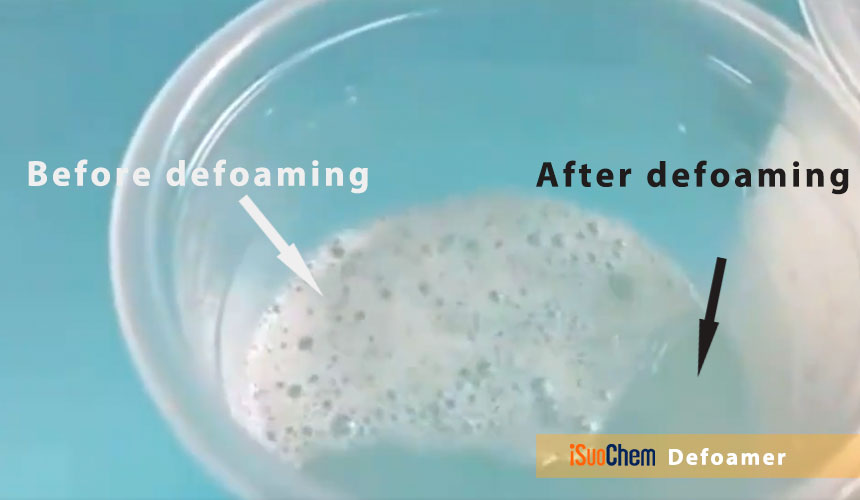How Defoamers Enhance Efficiency in Manufacturing and Production
How Defoamers Enhance Efficiency in Manufacturing and Production
Blog Article
Discover the Leading Benefits of Making Use Of Defoamers in Industrial Processes
The usage of defoamers in industrial processes provides a variety of engaging advantages that can boost operational effectiveness and product top quality. By efficiently managing foam production, these representatives not just maximize material flow yet likewise contribute to substantial expense reductions and improved sustainability. The effects of embracing defoamers may be much more profound than at first regarded.
Boosted Refine Performance
Optimizing commercial procedures typically includes addressing lathering problems, which can impede operational effectiveness. Foam formation can disrupt the proper performance of equipment, decrease the reliable application of sources, and make complex the surveillance of crucial criteria. By carrying out defoamers, industries can effectively reduce these problems, resulting in structured procedures and boosted performance.
Defoamers work by destabilizing the foam framework, enabling for fast collapse and considerable decrease in foam quantity. This activity not just boosts the flow of products through devices, such as mixers, reactors, and pipelines, yet also lessens interruptions brought on by foam overflow. Devices downtime is minimized, permitting for a much more effective and continuous manufacturing procedure.
Furthermore, the use of defoamers can cause decreased power consumption. With less foam to handle, compressors and pumps can operate more effectively, causing lower functional prices and an overall enhancement in procedure throughput. Inevitably, the strategic use defoamers not just addresses immediate lathering obstacles but likewise adds to a much more efficient commercial community, promoting an affordable advantage in a requiring market.
Improved Product Quality
The combination of defoamers in commercial processes plays an important function in enhancing product quality. By properly regulating foam formation, defoamers add to the uniformity and uniformity of last products. Too much foam can result in oygenation, which adversely influences the texture and security of formulas, particularly in industries such as food and drugs, drinks, and finishes.

Moreover, defoamers facilitate much better blending and diffusion of ingredients, causing homogeneity in solutions. This is necessary in applications where precise component proportions are essential for efficiency and safety. Furthermore, the removal of foam can lower the risk of contamination during manufacturing, further safeguarding product honesty.
Ultimately, by improving item top quality, defoamers not only boost consumer complete satisfaction yet likewise reinforce brand name track record. Their role in keeping premium standards emphasizes their significance in modern-day industrial procedures.
Cost Decrease Advantages
Applying defoamers in commercial processes can bring about substantial price reduction advantages. By successfully controlling foam development, defoamers lessen product loss throughout manufacturing, thereby enhancing product use. This reduction in waste converts straight into reduced resources costs, boosting total operational effectiveness.
In addition, this hyperlink the usage of defoamers can reduce energy intake. Excessive foam can hinder tools performance, bring about boosted energy demands to maintain manufacturing degrees. By minimizing foam, defoamers help with smoother operations, permitting equipment to run more effectively and lowering power expenses.

Furthermore, defoamers can shorten processing times. By making use of defoamers, industries can improve their processes, leading this to faster turn-around times and boosted throughput.

Environmental Impact Mitigation
In industrial processes, the use of defoamers plays a crucial duty in mitigating ecological effects connected with foam generation. Foam can result in substantial functional ineffectiveness, causing raised discharges and waste generation. By efficiently controlling foam, defoamers aid preserve process performance, consequently minimizing the general environmental impact of operations.
Moreover, too much foam can overflow control systems, resulting in spills that may contaminate dirt and water sources. Defoamers assist decrease this risk by guaranteeing that lathering does not go beyond prescribed limits, promoting conformity with environmental guidelines. This positive approach not only safeguards ecological communities but additionally enhances the sustainability of commercial practices.
Furthermore, using defoamers can decrease energy consumption in various procedures. defoamers. Decreasing foam formation decreases the demand for extra energy-intensive steps, such as boosted anxiety or pumping, which might or else be essential to take care of foam. Subsequently, the adoption of defoamers lines up with broader sustainability goals by advertising power performance while reducing the carbon impact of commercial tasks.
Eventually, incorporating defoamers right into industrial procedures is a strategic measure that sustains ecological stewardship and liable source management.
Adaptability Throughout Industries
Across numerous industries, defoamers demonstrate exceptional versatility, adapting to the details demands of varied applications. In the food and drink industry, for instance, defoamers are critical to preserving product top quality by preventing foam formation during handling, which can influence texture and taste. Similarly, in the pharmaceutical market, defoamers make sure the stability of formulations, enhancing item efficiency and uniformity.
In the chemical manufacturing world, defoamers assist in smoother procedures by lessening foam in reaction vessels, therefore improving yield and decreasing downtime. The paper and pulp sector relies on defoamers to boost the performance of pulp processing and paper manufacturing, making certain ideal product their explanation honesty. Furthermore, in wastewater therapy centers, defoamers play an important role in regulating foam during aeration procedures, resulting in improved therapy results.
The flexibility of defoamers includes the oil and gas market, where they help in managing foam in boring liquids and manufacturing processes. By customizing formulations to satisfy specific market requirements, defoamers act as crucial tools that boost operational performance, product top quality, and overall procedure effectiveness throughout a wide range of industries. Their flexibility emphasizes their value in modern commercial applications.
Final Thought
In conclusion, the use of defoamers in industrial procedures presents various advantages, consisting of enhanced performance, boosted product quality, considerable expense reductions, and positive environmental influences. Their capacity to efficiently manage foam formation contributes to operational continuity and resource optimization. Furthermore, the adaptability of defoamers across varied sectors underscores their important role in promoting sustainable methods and earnings. The assimilation of defoamers stands for a critical technique to attending to obstacles related to foam administration in different making environments.
Eventually, the tactical use of defoamers not just addresses prompt lathering challenges but additionally contributes to a more effective commercial community, cultivating an affordable advantage in a demanding market.
In industrial procedures, the usage of defoamers plays a vital function in mitigating ecological influences linked with foam generation. By effectively managing foam, defoamers assist preserve procedure performance, thereby minimizing the total ecological impact of operations.
In addition, in wastewater therapy centers, defoamers play an essential duty in regulating foam during aeration procedures, leading to better therapy end results.

Report this page